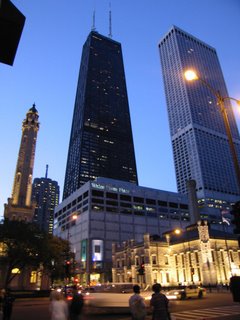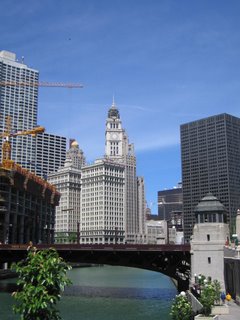Reader Marian Wirth recently took me to task over an earlier piece on immigration. Marian took issue with my characterization of French and German immigration policies, and expounds on the debate much more fully his own website.
First, the semantic issues. It is quite true that the failure of border patrol in the United States does not amount to much of a policy. As for what German immigration is, I’ll defer to Marian’s more intimate familiarity with that issue. However, what I was speaking of was immigration systems. This is probably a bit of a vague term, so I’ll get on with it.
Second, and more to the point, I want to address the illegal immigration issue here in the United States.
Ever since I can remember, the political discourse in the United States regarding immigration has been broadly characterized in the media as a typical struggle of Marxist proportions (although no newspaper will use those words). Specifically, the media portrays it as a struggle between poor, downtrodden laborers, and the rich, racist, WASPs who criminalize them with wicked laws. Since 9/11, another hue has been added to the picture: In addition to being rich, white, and oppressive WASPS, those in favor of tighter border security are now portrayed as paranoid right-wing nutjobs irrationally trying to isolate themselves from the world. This is a characterization which Democrats have unfortunately been quick to seize upon. From the Pete Wilson-era propositions which would have discontinued funding for bilingual immersion classes, and withheld all but emergency medical services from illegals, to the push to require legal status (citizenship, residence, guest worker, approved student, etc.) in order to obtain a driver’s license, anything that tried to find any semblance of structure was met with one epithet: racist.
Thus, anyone who didn’t support the May Day protests with full-hearted enthusiasm must be racist. Never mind that nobody’s advocating an end to immigration; the boycott was also called Immigrant Day. Never mind that what many are objecting to is the flood of illegal immigration. If you opposed illegal immigration you must be ipso facto a racist opposed to all immigration. Many of the organizers wanted the world to think that this was all about jobs and nothing else. (It really is no coincidence that the people trying to turn this into a debate about labor mobility are, for the most part, post-modern Communists. International A.N.S.W.E.R., a vociferous critic of capitalism, was one of the organizers. The first of May, by the way, happens to be May Day, or International Workers’ Day, a Communist holiday.)
So let’s take them at their word, that all immigration was only about jobs. Let us also take into account the fact that the overwhelming number of illegal immigrants are from Mexico, which the activists would have you believe is a symptom of racism, rather than of the geographical fact that Mexico has a long border with the United States. If the issue was only jobs, why not reform the immigration system so that we have a more flexible way of providing for everybody’s needs?
Like Mad Minerva, I come from a family that immigrated to the United States legally (although many better-placed families were able to use their connections to expedite their visa applications in the rush to leave Taiwan after President Carter officially switched recognition to the People’s Republic of China). We would represent those that intend to make the United States our home, a place where we intend to develop roots.
There are many others who would be more than happy to just come to the United States to work, then after they’ve saved up enough money, go back to their home countries and, hopefully, retire. Examples of these include a large portion of illegals from Mexico, but also a large number of pre-20th Century immigrants from all over the world, including Ireland after the potato famine, and China during the California Gold Rush. Many of these probably would like to stay eventually.
And why not? Engraved at the base of the Statue of Liberty is a poem that beckons to the world’s tired, hungry, and wretched. America, it is said around the world, is a land of dreams, of opportunities. The tales of streets paved with gold are a bit exaggerated, but the promise of reward to go with a good work ethic is basically alive and well.
But what dream would it be if it could be dashed at any moment by instability, if there is no rule of law to settle disputes? And yet some of these activists would have us throw out our system of laws, just because Jose or Juan couldn’t be bothered to file for a work visa?
Clearly, the status quo does not serve us well. But is amnesty the right answer? DJ Drummond thinks so, and brings up some very good points:
Sharpen the definitions of ‘citizen’ and ‘resident’, make clear that we welcome all sorts of legal immigrants but must protect our borders and enforce our laws, and offer the chance to start over for people who leave politely and immediately. And make very, very clear that anyone who remains here against the law after than point may expect a stronger and more determined, coordinated response at all levels.
I don’t care for the word “amnesty”, but if that’s what it must be called to get the requisite votes to clear Congress, so be it. But DJ is clearly on the right track. There is no way we can afford to deport 12 million people. Like it or not, we’re stuck with them. So, how do we integrate them into our society, and how do we pave the way for a more effective future system?
I won’t pretend that I have the perfect, or even the only viable plan. But here’s what I think:
- Revamp the guest worker program. Create two tiers, one for skilled professionals and another for unskilled professionals. Unskilled professionals will not be entitled to unemployment benefits, and will have shorter grace periods for picking up new work in case of a layoff.
- Increase staffing in consulates general to expedite background checks.
- Amounts paid into social security can accrue for future payouts, but if a worker is forced to leave the country by, for example, unemployment or other ineligibility for renewal, and does not qualify for re-entry for more than a year, amounts paid into social security are forfeit. That money could probably be best used to pay benefits to citizens and legal residents, who, in an economy that cannot even employ guest workers, will probably need the help.
- Harsh penalties for human traffickers. I suspect a lot of these middlemen entice workers with promises of the golden land in exchange for exorbitant amounts of future debt. This is at the very least true for many illegal immigrants from China; there is nothing that suggests that it isn’t true of illegals from Mexico or other places as well.
- Rather than designate current illegals as felons, allow them a grace period to apply for guest worker status. Those with violent criminal records must be deported immediately. Those with minor, non-violent records must pay a fine. Those who have been here for less than, say, 5 years must also pay a fine. None will qualify for social services in excess of what they earn from here on.
- In all cases, contribution to and participation in local communities will be mitigating factors.
The point is, people see the shining beacon that is America. They should be allowed to become “official” Americans, provided they can show, through their hard work and contributions to the life of the community, that they love this country. This is important; have you ever seen the giddiness a “newly minted” American exudes? While certain cultural values will always be shifting, others cannot be abrogated. Civic awareness, typically very low in non-Western nations, is important.
Integration does not mean simply providing services and then hoping the immigrants sink or swim, as with the European model. Integration means actual involvement with the day-to-day civic life. Perhaps America doesn’t need to reach out anymore to scour the planet for those who want to come here; but we need to make sure there are no delusions about what it takes to be an American, and no mistakes that the vast bounty of America’s resources will not be doled out to those who would break American laws.
I imagine some will be turned off by this. You can’t please everyone. But I’m pretty sure that if someone is turned off because he has to (*gasp*) work at getting what he wants, American really doesn’t want him around. We’ve got plenty of people who already do not believe in personal responsibility; we don’t need more.
[Cross-posted at Between Worlds]






